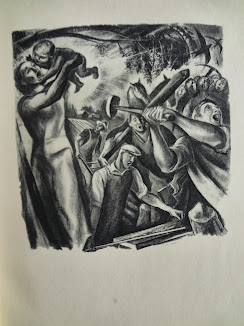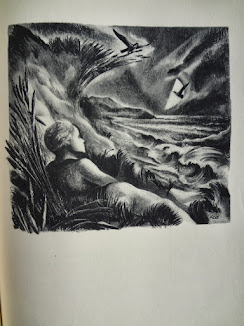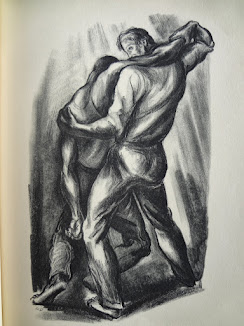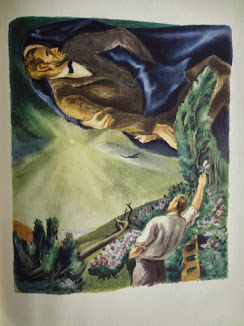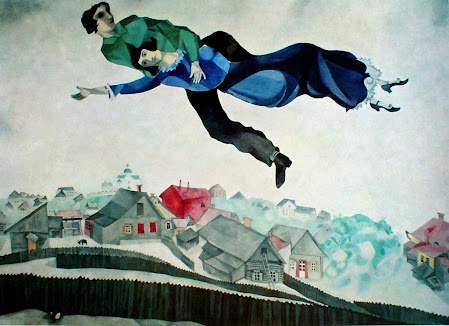This was originally written in July 2011
I was talking with my husband the other day about Ragnarok, the Norse Armageddon, and kind of jokingly saying it was the first alt-history. Ragnarok is this really specific telling of the last days of the Norse Gods, a catalog of who will kill whom and how. It’s understood to be told in the future tense, something that hasn’t happened yet, but will, with exactness and finality. He was like, but isn’t that prophesy, like Revelations? I admit my knowledge of Revelations is a little crappy, but I don’t think that Ragnarok is quite the same. It’s less a story of what we humans should watch out for, so we can head to the underground bunker or whatever we’re supposed to do when the End Times are upon us. It’s not a manual, or a guide. It’s just a story about the inevitability of when certain kinds of personalities – large, inhuman or metahuman personalities – come into conflict with one another. It’s a chess game, not a chess guide. History, even history of the future, isn’t so much not to be repeated as embraced as the stories are told.
So, when I was in high school, I had this great assignment where I had to do a research paper about some public happening that went down in the year I was born. I was born in 1974, so I duly went to the microfiche and scrolled through the local headlines. Those older than me will shake their heads, but I was like, OMFG I CAN’T HANDLE ANY MORE WATERGATE. It was too much, too complicated, even though it was the thing that defined the year, and years on either side: the growing scandal, the series of indictments and resignations, the pardon – oh, the pardon. Fodder for a thousand research papers, a thousand books and movies. Certainly more than I could handle in 5-7 double-spaced pages.
So, I found Patty Hearst. Patty was an heiress of the Hearst newspaper empire – William Randolph Hearst being the subject (mostly, though the protagonist was an aggregate of several personalities) of Citizen Kane. She was abducted out of her apartment by a post-Helter Skelter cult called the SLA – the Symbionese Liberation Army. (I still have no idea why that name, and I can’t really remember their goals, which were a stew of 70s revolutionary cliches and “free love”, which was code for cult leader gets to bang whomever he wants.) (Also, she was at home that night with her upper class douchebag fiancée, a guy whose name was Stephen Weed, I shit you not. Pynchon couldn’t have named him better.)
Anyway, after a several months of rape, imprisonment, and a good dose of Stockholm Syndrome, Patty helped rob a Hearst bank with the SLA. Oh, the pregnant symbolism! I don’t remember all the details, but press releases were issued proclaiming her new cult name of Tania – still with the Pynchonian names. Public opinion was wildly against her. How dare she turn against her robber baron family money? Being raped and terrorized was not really credited in understanding her motivations. Again, I don’t remember all the details, but it turned into months – maybe years? – of the SLA playing cat-and-mouse with law enforcement, ending in a Waco-style shoot-out with fire and the death of most of the cult. Not Patty though. Somehow she survived.
So Patty is a fascinating American character. She later renounced all her SLA stuff, but it wasn’t enough to keep her from getting convicted of armed robbery. Her sentence was later commuted by Carter, who probably found the defense’s argument compelling about how she had no live ammo, and that most of the SLA guns in the robbery were trained on her, not the bank officials, and the fact that she’d been abducted, brutalized and raped into these actions. (Like me; I admit my bias.) She’s later been a regular fixture in John Waters films — including one where a woman is abducted into a film cult bent on bringing down the military-entertainment complex — seriously, Pynchon is like the patron saint of American history.
So, point being — and seriously, I have one — even history is an alternate history. There’s the stuff that screams from the headlines day after day, then there’s the stuff that goes down on the sidelines, which is no less meaningful, in terms of national identity and symbolism. I talked with my folks a lot about this project – in fact, I’m pretty sure one of them pointed me toward the Hearst story in the first place – and it was fascinating to hear them talk about the paranoia of the time, the sense of the end of it all. Night of the Living Dead premiered in 1969, and it was this perfect encapsulation of the times, written in horror. Kennedy may have been shot down in ’63, but it wasn’t until the murder and assassinations of the late 60s — Bobby Kennedy, Malcolm X, Dr. King — that we understood that our post-War dream of enforced middle class domesticity was tearing at the seams, letting out blood into a colonial conflict that, strangely, only Nixon could end, even while he shat all over executive privilege and the Presidency. (And, I have no patience with all of the mealy-mouthed talk of him being “controversial” when he died a few years back. Only if you find treason controversial, and not criminal.)
So. Alternate history. Here we are again in America, at the end of it all. Maybe we’re always at the end of it all. Maybe the millenarian instinct is in our DNA, in our constitution, and I totally mean that as a double entente. The 2nd Amendment is a hedge against the [zombie] apocalypse, something I always think about when I consider my neighbors from two doors down, who are avowed gun nuts with a racist caricature of Obama hanging in their window. I’d be over their begging for guns in heartbeat if zombies descended on my city, and it’s amusing as all get out to me that I’ve even considered the possibility. Cuz I have, American that I am.
At the opening of Saving Stony Mayhall by Daryl Gregory. John is found at the side of the road by an Iowan family. His mother is dead, and he is an undead, bubbling infant. It’s the late 60s, and in this mildly alternate beginning, the zombie uprising in Pennsylvania that is chronicled in Romero’s “documentary” is fact. Though this is a slightly histrionic comparison, the terror of the Twin Towers had been located 50 years earlier, so America was building its Gauntanimos and security state apparatuses 50 years earlier, to work against the undead threat. (Though we’re always building against a threat. We’ve always seen our threats as twinned — coming from within and without — fear of the Soviets and the Red Scare; Al Qaeda as well as that home-grown shoe-bombing idiot. Heck, lots of Americans think the Twin Towers was the result of the CIA, not Bin Laden, as we work against ourselves or something. I’m not really interested in getting into a big thing about this, I just want to point out that we have this headline narrative, and then a whispered narrative, whatever the truth may be.) John, or Stony as he comes to be known, is a zombie anomaly — zomnomaly? see, I am shit for portmanteau, unlike Mike who coined the term ‘zombildugsroman’ for this book — he grows from zombie infant into zombie boy, and then, as most of the story is concerned with, into zombie man.
The rest of the undead are bitten breathers, who, after a nasty, murderous incubation period of 48 hours or so, wherein they bite and kill like we have all seen on tv, they resolve into people who are not dissimilar from the ones the were when they were breathing. Some forget themselves, having their memories wiped by death. Some don’t. Stony moves from his claustrophobic but largely idyllic childhood on the plains of the Midwest into a graduation of the larger, undead community. The undead play cat-and-mouse with the Feds, reluctantly, not so much a cult as a folk group of the damaged, with their own folk myths and legends, political factions, schismatic religions, and personalities. As their numbers dwindle through attrition and active attacks, they ponder the Big Bite, a Ragnarök of starting the zombie apocalypse so that their number will replenish, and they can stop living in fear of the living. As the living live in fear of the dead.
I don’t even know how not to be all spoiler about this, but certain things are inevitable. You can’t write a zombie story without that sense of the End Times, it just matters whether you think the End Times are about warning or historical understanding. This story is about Patty Hearst, not Watergate, even though those things are twinned, bubbling out of the same cultural stew. Like Patty, Stony’s story is personal, personal enough that I can remember her stupid fiancé’s name when I have no idea the name of Spiro Agnew’s wife. (Hell, even Nixon’s. What was it? Francine? Imelda?) Patty’s story is fascinating because of all the familial symbolism, even while it intersects with Presidents and filmmakers, Patty an abducted lighting rod for a bunch of symbolism about class, privilege, politics, religion and on and on. Stony is a bit of the same, sorta, a simple Midwestern boy but for the fact that he doesn’t breathe, caught up in the times. Stony is a reluctant protagonist, like we all are reluctant protagonists, and the mythology, the explanations he lays out in this novel have the exciting frission of a good retcon. Not the kind that sucks, and restarts everything wiping out the past, but the kind that takes the past into account, and writes its exegesis. There’s a lot here for a zombie nerd to love, a catalog of genre ticks made sensible. And sensibility is this book’s heart.
Zombies are irrational, unscientific. Dead is dead. My husband always tries to placate my zombie freak-outs with the utterance, “But…physics,” but which he means that zombies violate the rules of physics and can’t exist. This book takes but…physics seriously, building an alt-history predicated on the impossible, relying on an alt-physics of will and psychology, coming down to a End Times of inevitability which is or is not inevitable, but happen[s/ed] anyway, based on the rules of the future tense, the future tense of all national stories. I don’t want to make this story sound mythic, though there is discussion of how the personal narrative transmutes into folk legend. It’s complicated and personal, much more so than the headlines might suggest, so much sadder than Revelations, so much quieter than Ragnarok. Damn fine.
P.S. I often write myself out of saying stuff like this, because it doesn’t fit in the standard 5-paragraph essay, but there’s a lot here that’s funny as shit, but slyly, like an undead character based on Col. Sanders, and a random aside about the undead mascots who schill for various products, like the Sinclair dinosaur. Charlie the Tuna wants you to eat his dead flesh ahahahahaha. Gross. Clever.



